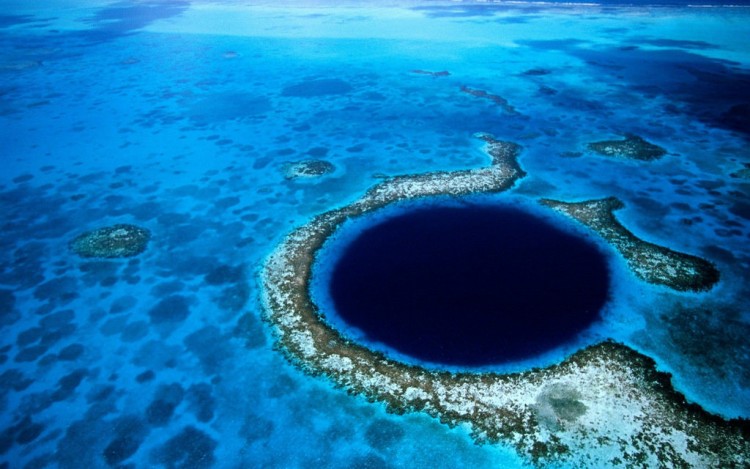Marine explorers aim to shed light on many mysteries of Great Blue Hole
Located 74 kilometres off the coast of Belize, the sinkhole is known for its crystal-clear water and its abundance of sharks and sea life.

- Country:
- United States
The Great Blue Hole -- a giant marine sinkhole off the coast of Belize -- may be holding secrets dating back thousands of years, from life forms unknown to mankind to undocumented stories of Mayan sea-farers, according to a renowned deep sea explorer and conservationist.
One of the most famous diving zones in central America, the Great Blue Hole is thought to have been shaped by geological forces over 10,000 years ago.
Located 74 kilometres off the coast of Belize, the sinkhole is known for its crystal-clear water and its abundance of sharks and sea life.
The nearly perfect sphere of deep blue water, measuring 300 metres across and 125 metres deep, has only been explored once -- back in 1970 by Jacques Cousteau, a pioneering marine conservationist who studied the sea and all forms of life in water.
His grandson Fabien Cousteau now prepares to journey to the same spot in a fully-manned submersible, unveiling the deepest secrets of the watery underworld live for viewers across the globe.
In a two-hour television special called Discovery LIVE: Into The Blue Hole which will be broadcast around the globe in real time, 51-year-old Cousteau will explore the sinkhole and attempt to shed light on its many mysteries.
"Despite the amazing exploits of my grandfather in 1970, which was offered in a show in 1971, the Blue Hole has held on to many secrets, including the evidence of climactic change over the last hundreds or thousands of years -- if not more, which gives us a lot of insights in general as to what we as human beings are facing," Cousteau told PTI over a telephonic interview.
"Because of the Mayan and pre-Mayan civilisations in the area, there is a probability -- actually almost a certainty -- that the Blue Hole waters were visited by the Mayans, perhaps multiple times in history. We will be looking for evidence of that possibility as well," he said.
The Blue Hole has never been mapped or even plotted -- and while many speculate what is at the bottom -- the exact answer remains unknown.
The team of explorers, which includes UK businessman Sir Richard Branson and Erika Bergman from the US, will conduct a detailed 3D scan of the entire Blue Hole for the Belisian government.
According to Cousteau, the sinkhole hosts an ecosystem that we know little about, and thus there is a possibility of discovering creatures not known to mankind.
"We have no idea what the Blue Holes could give us. Between the legends, the sightings, and anecdotal stories, we are very much looking forward to deciphering some of the mysteries that the Blue Hole is holding," he said.
"Although Cousteau is no stranger to the marine world, having made his first dive at the tender age of four, he admits to being a little nervous about going into a place that his grandfather "deemed as one of the top ten destinations in the world."
He considers his family legacy as a privilege as well as a great responsibility.
The journey will inevitably conjure up in the public mind a nostalgia, he said.
However, Cousteau has the advantage of cutting-edge satellite technology that makes live-streaming of his exploration possible.
With such adventures, he hopes to captivate the world’s imagination, inspire young minds to explore careers that they never knew of before, and bring attention to the immediate need of environmental conservation.
"The environment and conservation is the only investment in our natural resource ‘bank account’ in the future well-being of our children. Without a healthy planet, there are no such things as healthy people, Cousteau said.
"So it behoves us to highlight the fact that we must take care of our planet, the way we do for ourselves and our family. If we are going to imagine a brighter future for ourselves," he said.
The show will premier Monday, December 3 at 2:30 AM IST on Discovery TV channel. A repeat of the show will be broadcast on the same day at 8:00 pm on Discovery and Discovery HD World.
The show will explore a variety of sea-related topics such as how the Blue Hole was created, how technology has evolved since the first mission, and will delve into the many legends surrounding this unique spot.
The broadcast, hosted by marine biologist Luke Tipple and presenter Chris Jacobs, will document the team's descent into the Blue Hole.
Vessels will continue exploring the Blue Hole for two weeks after the dive and track the site.
The data collected will help construct real-life models of the Blue Hole's geographical features to help researchers from around the world understand how changing sea levels affected its formation and to provide key information about climate change patterns.
(With inputs from agencies.)










